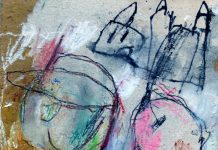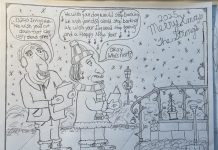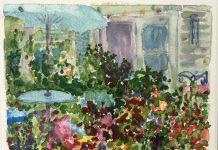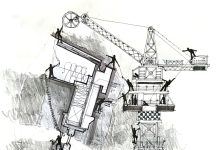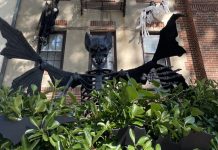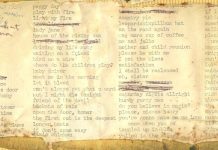I was seven when an aneurism grew like a rotten berry inside Mother’s brain and burst. Everyone said, at least her suffering is over, the migraines, so unbearable, and even though she died with her head tilted to one side and a permanent grimace, they said, she went peacefully, as if she’d gone for a walk through the quiet woods and woke up in some place far away from here.
Oh how they lied with so much conviction, and how I never found comfort in it, only the creak of my closet door after Mother’s funeral came to pass, the creak that I first told myself was the house shifting, the creak that became commonplace as I fell asleep, before it became the creak of her dirtied feet stepping so slow across the floorboards of my room through the widened crack of my closet door, the sour wind of Mother curling around me.
She was in my bed with her arms cradling me before I knew what the creak meant. I knew it was her by how she felt, so familiar, yet so unlike herself. Mother, I mouthed the words, but no sound came out. I was afraid to look at her, to feel the long lace sleeves of her dress around my arms. How itchy. How if I’d known I would’ve insisted they bury her in something else, how I’d find a way to tell her because I didn’t want her to be mad. I would tell her, to distract myself from the noise that Mother made like a television that’s been left on in a distant room after everyone’s gone to sleep, phantom voices in the silence between the creaks when Mother came and went. I knew eventually the broadcast would run out, and the man on the TV would ask, Do you know where your children are? Then the TV would buzz, full of static. How loud Mother could be without saying a word.
Her veil rested on the back of my neck, the veil placed over her head to disguise her contorted face; it was itchy like the tags she used to tear from my shirts, but I wouldn’t tug to remove it because her bent neck, flinched brow and twisted lips were much worse than the veil. So cold, Mother, full of rigor mortis. She smelt like embalming fluid and earth. I reached back and pulled a piece of moss from her dress to turn in my hands, to believe Mother was still real. In the morning I’d still be clutching it. I would see the way she had shuffled out from the stains on the floor, back through the crack of my closet door while I slept.
Winter came to pass. In summer I told Mother, please stop coming, and they were the first and last words I’d ever say to her as she lay there soaked from rain, full of decay, fingers frayed and purple clutched around my arm, her bones visible, pressing in harder. Eerie TV chatter was coming from somewhere deep inside of her. I pressed against her to see if I could understand enough to be soothed by a familiar sitcom unraveling like a tape inside her mouth stitched shut. I could never look at her. I would’ve never stopped screaming. It was our last night together.
The creak stopped coming from the closet and started coming from my stifled cries. Open mouthed I screamed into my pillow for Mother, unintentionally smearing what was left of her from my pillowcase and bedsheets into my hair, across my face and into my mouth. I listened for the almost inaudible voices that accompanied her. Nothing. That was the way it was supposed to be. When your Mother dies, you mourn. Mothers don’t come back ever or leave moldy leaves in your bed and forget to clean them. Mothers don’t smell musty, but they open their eyes and smile. They smile because they’re alive.
The chill of Mother came into me after she left. Crying turned to coughing and coughing to gagging and hacking up mucus. First came her freshwater pearl earrings sitting in a pile of my vomit, Mother’s earrings, her Sunday best, buried with her. So Pretty. I washed them and placed them on my dresser. I folded a piece of paper and shut it between the closet door and its frame to see if Mother would come, but the paper stayed wedged there.
My stomach turned, and I knew what came next because after I dry heaved so hard I could feel it in the back of my throat. Mouth opened wide, my fingers searching, I felt it and pulled. Mother’s heart necklace dangled in front of me, dripping bile. After that it was the veil and her lace sleeves, clasp of her bra, the embroidered handkerchief left folded between her stiff hands. It was one rose painted fingernail, then two and six and ten. It was her hair and skin and bones, torrents of Mother’s curdled body coming from my mouth.
There was what was left of the blood clot in the palm of my hand, the rotten berry. There was the creak of my closet door, but I knew it was just the house shifting. Mother was already there spread out across my room, down the front of my nightgown, and waiting to crawl from the darkest places inside of me.




